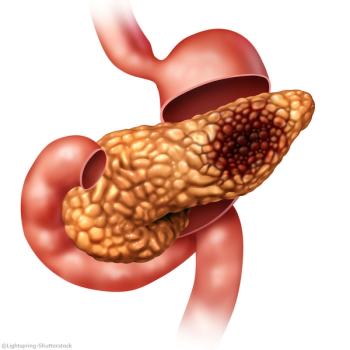
Oncology NEWS International
- Oncology NEWS International Vol 14 No 8
- Volume 14
- Issue 8
Erlotinib Yields Survival Benefit in Advanced Pancreatic Cancer
TORONTO, CANADA-Addingerlotinib (Tarceva) to gemcitabine(Gemzar) increased 1-year survivalby 40% for patients with
TORONTO, CANADA-Addingerlotinib (Tarceva) to gemcitabine(Gemzar) increased 1-year survivalby 40% for patients withadvanced pancreatic cancer in a phaseIII international study (abstract 1)."This is the first trial to show a survivalbenefit for a targeted therapy in ad-vanced pancreatic cancer. And thistrial has shown that gemcitabine pluserlotinib is superior to single-agentgemcitabine," according to MalcolmMoore, MD, the study's lead investigatorand Director of the New DrugDevelopment Program at PrincessMargaret Hospital in Toronto."This is also the first demonstrationof the benefit of an epidermalgrowth factor receptor (EGFR) tyrosinekinase inhibitor in combinationwith chemotherapy in any disease,"he added.Patients Totaled 569The double-blind placebo-controlledphase III study, conducted bythe National Cancer Institute of Canada,Clinical Trials Group at QueensUniversity in collaboration with OSIPharmaceuticals, enrolled a total of569 patients with locally advanced ormetastatic pancreatic cancer. Patientswere balanced in terms of known prognosticfactors-performance status,locally advanced vs metastatic disease,and the presence of pain. Most patientshad measurable disease.Patients were randomized to receivegemcitabine (1,000 mg/m2 IVweekly for 7 of 8 weeks and then 3 of 4weeks) plus daily oral placebo (n =284) or erlotinib (n = 285). The erlotinibdose was 100 mg throughoutmost of the trial, but an additional,smaller cohort of patients receiving150 mg was later added to the study.All analyses are based on the entirestudy group.Primary Endpoint MetThe study met its primary endpointof overall survival. "The hazard rate ofsurvival is 0.81, which translates into a24% improvement in survival fromthe use of erlotinib with gemcitabine,"Dr. Moore said. The median survivalfor patients in the erlotinib arm was 6.4months, vs 5.9 months in the placeboarm. "The 1-year survival was improvedfrom 17% to 24%, which is an approximateimprovement of 40%," he reported.Progression-free survival forpatients treated with erlotinib was3.75 months, compared with 3.55months for those receiving placebo.Tumor response occurred in 57.5% ofpatients receiving erlotinib, vs 49.2%of patients receiving placebo.Rash Linked to BetterResponse"Whatever subset we looked at, thehazard ratio was always less than 1,which indicates a positive effect in favorof erlotinib," Dr. Moore reported."In some particular subsets, the effectof erlotinib seems more pronounced,particularly in the performance status2 patients and in those with metastaticdisease. However, as these are subsetanalyses, these are really just hypothesesgenerating."Expected adverse events includedrash, diarrhea, infection, and stomatitisand were generally tolerable andmanageable. As seen before with erlotinib,patients who developed a rashresponded better to treatment. Grade3 and 4 toxicities "were relatively lowin both arms," Dr. Moore said, andthere were "no differences in hematologic,in renal, or in hepatic toxicitiesbetween the arms." Quality-of-life assessmentsshowed "no detrimental effectson quality of life from the additionof erlotinib to gemcitabine."Further Refinement Neededto Identify Which PatientsWill Benefit"The small improvement in survivalafforded to erlotinib-treated patientswas accompanied by increasedtoxicity, challenging us to think carefullyabout the therapeutic index, whenan unselected population of patientswith pancreatic cancer is exposed tothe combination of gemcitabine anderlotinib," James L. Abbruzzese, MD,of M. D. Anderson Cancer Center inHouston, noted. Understanding thereason for the relationship betweenthe erlotinib-induced skin rash andimproved outcome "will be a criticalfirst step in identifying patients mostlikely to benefit from EGFR antagonists,"he said.He also said that "a detailed pharmacoeconomicanalysis to include thecosts of drug treatment as well as thecosts of managing incremental toxicityencountered with this combinationwould be highly instructive.""Based on these considerations, at thistime, I do not feel that the resultsclearly alter the standard of care forpatients treated with advanced pancreaticcancer and continued refinementof the patient population mostlikely to benefit from this combinationwill be needed," Dr. Abbruzzesesaid.Exploit Molecular Biology"For me, the disappointment ofthis trial is not as much the magnitudeof the statistical benefit or the uncertaintysurrounding the clinical benefit,but that the trial used a pathologicclassification developed in the 19th century,a drug development strategy fromthe 20th century, in an effort to developa 21st century targeted agent," DrAbbruzzese said. "In particular, inadequateassessment of the patient populationlikely to respond to targetagents during preclinical and clinicaldevelopment of erlotinib and othertargeted therapeutics has not allowedus to prospectively define which patientswill benefit from these drugs,"he continued."In the end, I think this trial's greatestcontribution may be to focus us,the oncology community, to increaseour efforts to therapeutically exploitthe molecular biology of complex malignancieslike pancreatic cancer, tolook for opportunities to interveneearlier in the process of pancreaticcarcinogenesis, and finally to continuethe hard work of identifying whichpatients are likely to benefit from targetedtherapy."
Articles in this issue
over 20 years ago
Intermittent Erlotinib With Docetaxel Shows Promise in NSCLCover 20 years ago
Erlotinib Shows Early Activity in Liver Cancerover 20 years ago
Erlotinib Shows Promise as First-Line Therapy, Phase II Data Showover 20 years ago
Bevacizumab/Erlotinib CombinedBoost Responses in Renal Cell CaNewsletter
Stay up to date on recent advances in the multidisciplinary approach to cancer.






































